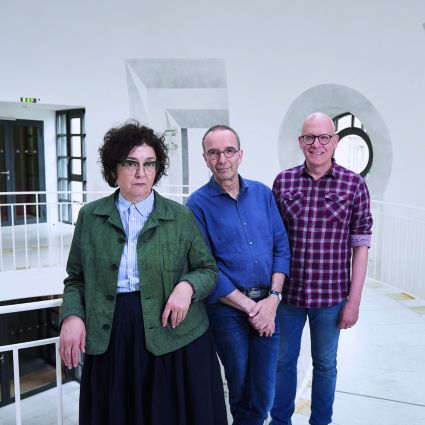Macht. Missbrauch. Musik - Deutsche Oper Berlin
What moves me
Power. Abuse. Music.
THE MASTERSINGERS OF NUREMBERG is about people whose profession it is to sing. Director Jossi Wieler explains why he and his team have chosen a music school as the setting for Wagner’s opera.
Art and the artistic life, rules and ruptures, tradition, innovation, old versus new, a young genius finding a mentor who’s set on shaping and guiding him. THE MASTERSINGERS OF NUREMBERG is also an opera about singing as a profession, so it has our own business as its subject matter, depicting the drill and the discipline, the pressure not to mess up and the fear and depression that that brings with it. This opera tells of power and the abuse of power in the world of classical music.
It is over three years now since Dietmar Schwarz, the Artistic Director of the Deutsche Oper Berlin, asked us – set designer Anna Viebrock, my co-director and dramaturg Sergio Morabito and myself - if we were interested in staging MASTERSINGERS. We would meet up at Anna’s place in the Eifel hills or Vienna, in Sergio’s home (he’s Principle Dramatic Advisor at the Wiener Staatsoper) or at my place in Berlin. We would read the libretto, listen to the music and chat, ranging back and forth over films, music, literature and, of course, Richard Wagner.

The history of the work’s reception by critics and audiences is complex. Alone the unspeakable final apotheosis delivered by the Hans Sachs character, the ongoing narrative of revolution and maturity culminating in populist sentiment, the anti-Semitic Beckmesser, the competition with a woman as the prize… How are we meant to address all that in today’s modern world? Maybe by showing how the eloquent and seductive Hans Sachs comes to dictate the rules of engagement and exploit the weaknesses in the system to push through his own, somewhat dubious reform agenda and also how far his manipulations are from addressing the dreams of young people today.
Three years ago the Me Too scandals were still rocking the media and our own sector. The former head of the University of Music and Performing Arts Munich was convicted of sexual coercion and before that there had been a scandal involving a film producer. And yet we hardly touched on the subject in our chats. After all, MASTERSINGERS is largely a comedic work, and we saw a Kafkaesque dimension to the piece, what with its large cast, its multiple narrative strands and the confusing rules imposed for the competition.
How do people survive in a hierarchical system? How do they find a path through this labyrinth? And do find their way out of the maze and settle down with their new self-knowledge?
Hierarchy, power, abuse. The latter can be sexual, but doesn’t have to be. Teachers, directors, conductors can create a toxic atmosphere to get the best out of their students, just as happens at the highest level in sport. And the freedom, talent and happiness of youngsters can get lost in the process, to say nothing of art. Creativity gets smothered by abstract ideas of discipline. That’s what we’re interested in. We’ve set our production in a music academy as a way of exposing the roots of this kind of power play. Ever since I started out in theatre, I’ve been reflecting on people’s relation to power in the art world. Theatres and opera houses are hierarchically structured, whereas I’ve been working as part of a team for decades. All my opera productions are the fruit of a trialogue with Anna Viebrock and Sergio Morabito. The very fact that I’m meant to be sitting here speaking on behalf of the three of us, because it’s easier and seems to make sense, is, I think, part of the issue that we’re trying to address in our production. The art world is a jumble of egos, ideas and teeming brains. Everyone has their own narcissism and wants to indulge it. Faced with all that, the trick is to get a community thing going within all that resultant heterogeneity. It requires patience and experience to emerge unscathed from all that commingling.
I don’t think I’d have been able to express all that thirty years ago. You have to take a step back – often in your way of working, too – and not be too precious, if you’re going to access the other side. The challenge is to find the only workable solution, although there’s more than just one creator working on the problem. That’s probably the paradox in the creative process: that achievement and quality are often born out of reticence.





